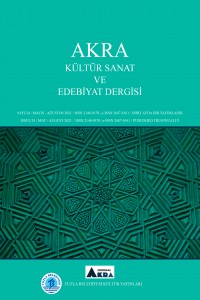Öz
Anahtar Kelimeler
Heimrad Bäcker tutanak belgesel yazın Holokost kolektif bellek
Kaynakça
- Achleitner, F. (2008); Über die Beschreibbarkeit des Unbeschreibbaren oder Versuch eines Nachworts zur nachschrift. Bäcker nachschrift. içinde K. Zeyringer, Österreichische Literatur seit 1945 (s. 131-132). Studien Verlag, Innsbruck.
- Bäcker, H. (1986); nachschrift. Linz, Wien: Edition Neue Texte.
- Bäcker, H. (2004); Tutanak. (E. Altan , & S. Saka, Çev.), Dünyadan Çıkış Yayınları, İstanbul.
- Bağ, Ş. (2014). Belgesel Yazın Üzerine. Humanitas (3), 39-46.
- Eder, T. (1998). Sprachskepsis in der Literatur Zu einigen erkenntnistheoretischen Vora-ussetzungen im. Modern Austrian Literature , 31 (3), 19-34.
- Gökalp, G. (2005). Türk Edebiyatında Somut (Görsel) Şiir. Türkbilig Dergisi , 10, 3-16.
- Güven, A. (2012). Toplumsal Dilbilimin Kapsam Alanı. Pamukkale Üniversitesi Sosyal Bilimler Dergisi (13), 55-62.
- Huber, F. (2008). Wie anzweigen Anmerkungen zum Dokumentbegriff von nachschrift. Modern Austrian Literature , 41 (4), 76-81.
- Miller, N. (1985). Prolegomena zu einer Poetik der Dokumentarliteratur. The Journal of English and Germanic Philology , 84 (1), 99-103.
- Porombka, S. (2000). Die Widerkehr zum Dokumentarischen. Literatur der Jahrtau-sendwende , 267-279.
- Sarı, A. (2006). Türk Alman Poetikasının Kitabı. Konya: Salkımsöğüt Yayınları.
- Weiss, P. (1971). Notizen zum dokumentarischen Theater. P. Weiss içinde, Rapporte 2 (s. 91-104). Frankfurt am Main: Suhrkamp Verlag.
- Wilpert, G. v. (1989). Sachwörter der Literatur. Stuttgart: Kröner Verlag.
- Zeyringer, K. (2008). Österreichische Literatur seit 1945. Innsbruck: Stu
Öz
In this study, the text of Heimrad Bäcker, who is considered to be one of the important representatives of the 20th century Austrian literature, named tutanak (nachschrift) was analyzed in the context of documentary literature. This extraordinary text of Bäcker falls into the "documentary literature" genre, which is also defined as political literature or docu-mentary prose. Documentary writing is a type of literature that first emerged in the 1920s and started a rapid rise in the 1960s and developed in the 1990s by blending with the concepts of media and communication. Documentary literature, which was a genre that developed in Europe in the 1960s, when political emancipation movements gained momentum, has become a popular genre due to its structure that allows many writers to express their political-ideological ideas critically. Documentary literature, which focuses on collective necessities rather than individual needs and aims to concretize realities in which social, political, legal and moral requirements are violated, through samples, presents a direct transfer to the reader that it wants to shake by pulling aesthetic and literary concerns into the background and confronting distorted reality. Since the 1990s, official documents and archives, which have been transferred to different media with an increasing variety in terms of quantity and quality in the world of advanced information and technology, have also affected the world of literature. Documentary literature, which gained an interdisciplinary character in this process, started to become widespread with the documentary theater. One of the most competent examples of documentary literature in German language, Bäcker’s text tutanak is a work in which the reports of genocide presented at the Nuremberg Military Criminal Court, the international criminal court where criminal mechanisms are tried in the post-World War II period, are transferred to the text universe without being aesthetized. In this study, which aims to analyze this text, which deals with the crime of genocide (Holokost) committed in Nazi Germany during the Second World War, in the context of documentary literature, methods of criticism towards the outside world were used. As a result of the researches, it has been determined that the relevant work has not been handled in any previous study, especially in the context of documentary literature. While working on an original documentary study of the literature together at this point, it is the first study dealt with the documentary record type example of work in Turkey.
Anahtar Kelimeler
Heimrad Bäcker tutanak documentary writing Holokost collective memory
Kaynakça
- Achleitner, F. (2008); Über die Beschreibbarkeit des Unbeschreibbaren oder Versuch eines Nachworts zur nachschrift. Bäcker nachschrift. içinde K. Zeyringer, Österreichische Literatur seit 1945 (s. 131-132). Studien Verlag, Innsbruck.
- Bäcker, H. (1986); nachschrift. Linz, Wien: Edition Neue Texte.
- Bäcker, H. (2004); Tutanak. (E. Altan , & S. Saka, Çev.), Dünyadan Çıkış Yayınları, İstanbul.
- Bağ, Ş. (2014). Belgesel Yazın Üzerine. Humanitas (3), 39-46.
- Eder, T. (1998). Sprachskepsis in der Literatur Zu einigen erkenntnistheoretischen Vora-ussetzungen im. Modern Austrian Literature , 31 (3), 19-34.
- Gökalp, G. (2005). Türk Edebiyatında Somut (Görsel) Şiir. Türkbilig Dergisi , 10, 3-16.
- Güven, A. (2012). Toplumsal Dilbilimin Kapsam Alanı. Pamukkale Üniversitesi Sosyal Bilimler Dergisi (13), 55-62.
- Huber, F. (2008). Wie anzweigen Anmerkungen zum Dokumentbegriff von nachschrift. Modern Austrian Literature , 41 (4), 76-81.
- Miller, N. (1985). Prolegomena zu einer Poetik der Dokumentarliteratur. The Journal of English and Germanic Philology , 84 (1), 99-103.
- Porombka, S. (2000). Die Widerkehr zum Dokumentarischen. Literatur der Jahrtau-sendwende , 267-279.
- Sarı, A. (2006). Türk Alman Poetikasının Kitabı. Konya: Salkımsöğüt Yayınları.
- Weiss, P. (1971). Notizen zum dokumentarischen Theater. P. Weiss içinde, Rapporte 2 (s. 91-104). Frankfurt am Main: Suhrkamp Verlag.
- Wilpert, G. v. (1989). Sachwörter der Literatur. Stuttgart: Kröner Verlag.
- Zeyringer, K. (2008). Österreichische Literatur seit 1945. Innsbruck: Stu
Ayrıntılar
| Birincil Dil | Türkçe |
|---|---|
| Konular | Sanat ve Edebiyat |
| Bölüm | Araştırma Makaleleri |
| Yazarlar | |
| Yayımlanma Tarihi | 20 Mayıs 2021 |
| Kabul Tarihi | 24 Nisan 2021 |
| Yayımlandığı Sayı | Yıl 2021 Cilt: 9 Sayı: 24 |


